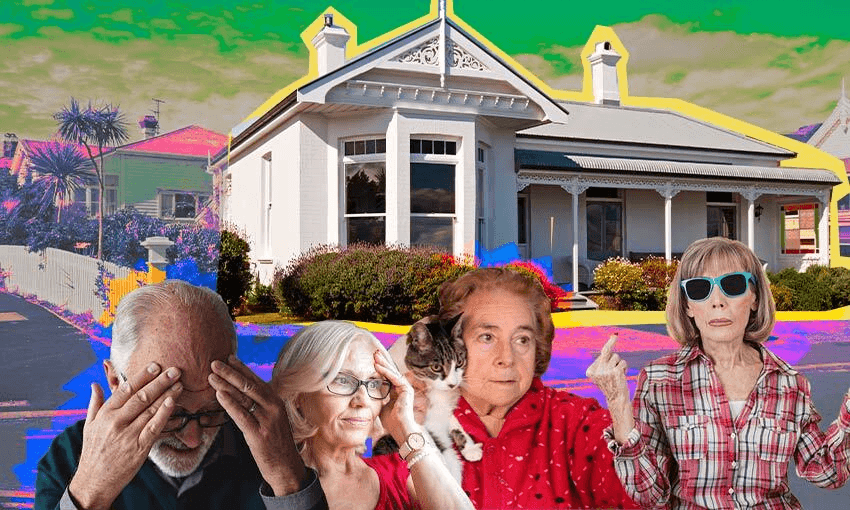On Thursday, Auckland Council talked about the government’s new housing rules. It was the worst council meeting of all time, since the last worst council meeting of all time.
About two hours into Auckland Council’s debate on the government’s bipartisan plan to enable more housing, planner John Duguid issued a stern warning. Allowing people to build more houses during a housing crisis may sound good, but it could have harsh side-effects, he said. “Adding this extra supply… to other areas that don’t currently allow this sort of density is like a farmer placing additional fertiliser on crops when we’ve already fertilised the crops, and it’s getting to the point where we’re damaging the very thing we’re trying to grow and nurture.”
Several councillors would pick out this quote as particularly incisive. “I love the fertiliser analogy,” said Waitākere councillor Linda Cooper. “If we’re doing a submission, it would be nice to include John Duguid’s little analogy,” said Albany councillor John Watson.
They were right: the analogy was worth highlighting, if only to remind the government why it needs to curb the council’s influence before it ruins anything else.
Duguid’s comparison was patently silly. A city isn’t a farm field. It’s quite literally the opposite. Houses aren’t fertiliser. They’re places where people live. Zoning for too much housing is a problem if you’re a bureaucrat who’s spent a career enforcing a pointless lattice of rules that mainly serve to protect the aesthetic preferences of the city’s most privileged residents. It’s a problem if you’re a councillor more interested in protecting the views of villa owners than the interests of anyone who doesn’t already own their own home. But it’s not a real problem. Houses aren’t the $1 lolly bags you get at the dairy. You don’t get sick from having too many.
The government’s new planning rules are meant to enable more abundant housing by allowing people to build medium density developments by right in most parts of Auckland and other major cities across Aotearoa. It would open up development land in city fringe suburbs where it’s currently outlawed on “character” grounds. Councillors talked at length about how the plan wouldn’t work. They said that infrastructure costs, not zoning, were the real issue. Duguid argued that because the Unitary Plan already allows for a million new dwellings, the law wouldn’t enable that many more houses to be built. Mayor Phil Goff pointed out the city was already consenting 20,000 homes a year.
With all due respect, who gives a shit? Even if all these complaints are right, and these rules fail completely, what’s the worst that could happen? Fewer houses than expected? It’s impossible to make our housing shortage worse by liberalising our zoning laws. For all the technical nitpicking, these planners and councillors weren’t worried that the new law wouldn’t work; they were worried it would. Their mouths were saying stuff about pipes, but their minds were dancing with terrifying visions of apartments in the leafy suburbs of Herne Bay and Ponsonby.
Christine Fletcher said the quiet part out loud. The Albert-Eden-Puketāpapa councillor called the law allowing townhouses in her villa-ville “tantamount to rape”. When called out, she doubled down, saying it was “gang rape because it’s by both Labour and National”. Earlier she’d asked Duguid whether he’d seen any research on the mental health effects caused by the “uglification” of cities. Duguid said he hadn’t recently. No-one asked about the mental health effects of living in cars or crowded houses. That’s probably not in the planning literature.
Other councillors said the quiet part quiet, and as a result, they didn’t make any sense. Manurewa-Papakura councillor Angela Dalton said she was concerned the new law would encourage development in outer suburbs not well-served by public transport. If she hates development in those suburbs, she’s going to be devastated to learn about the council’s existing Unitary Plan, which bans housing in a huge swathe of inner-city land, and instead shunts it out to places like Massey. It’s difficult to see how a new law explicitly ending that ban would hurt.
Elsewhere, Cooper credited council staff with being “brave” on the Unitary Plan, implying their reluctance to support this latest government measure must mean it really is bad. In reality, council staff and councillors put forward a Unitary Plan that was 200,000 houses short. They had to be overruled by independent commissioners in order to get the still-inadequate version we have today.
Near the end of the debate, Waitākere councillor Shane Henderson voiced some dissent to the dominant narrative. His voice quavering, he said his young family lives in one of those “ugly” developments his colleagues feared so much. “I’d invite people that think that our homes are ugly to come to my neighbourhood where we all know our neighbours. Our kids grow up together, they play in public parks next door. I’ll tell you we’re bloody proud of our homes,” he said.
He was joined by Maungakiekie-Tāmaki councillor Josephine Bartley, who reminded her colleagues there were bigger struggles than having to look at a design typology you don’t like. “When you’re living in your car, you don’t mind if the house is ugly,” she said. “If you’re in a car, you just want to live in a house. And I think we lose that perspective because we’re all doing pretty well ourselves.”
These speeches were outliers on a day of self-pitying whining from a pack of out-of-touch landed gentry. As their power slipped away, these officials and representatives abandoned any pretence of concern for the less fortunate. They threw their support behind the rich homeowners who pay their rates and the 35% of Aucklanders who vote in their elections. In doing so, they proved exactly why the government wants to exclude them from planning decisions. Local input can be great. But sometimes it’s like over-fertilising a field. Too much of it can spoil the city you’re trying to grow and nurture.

